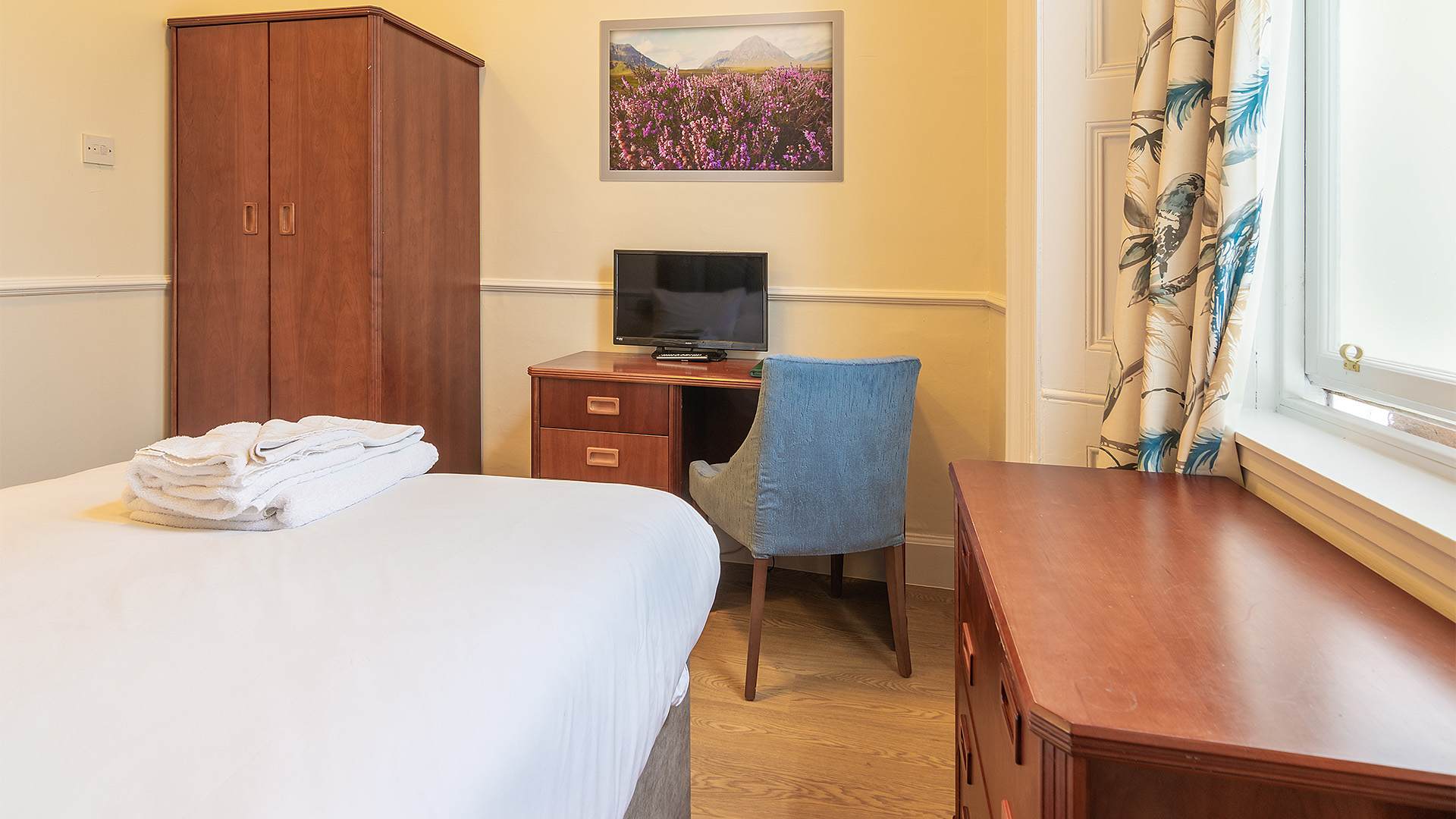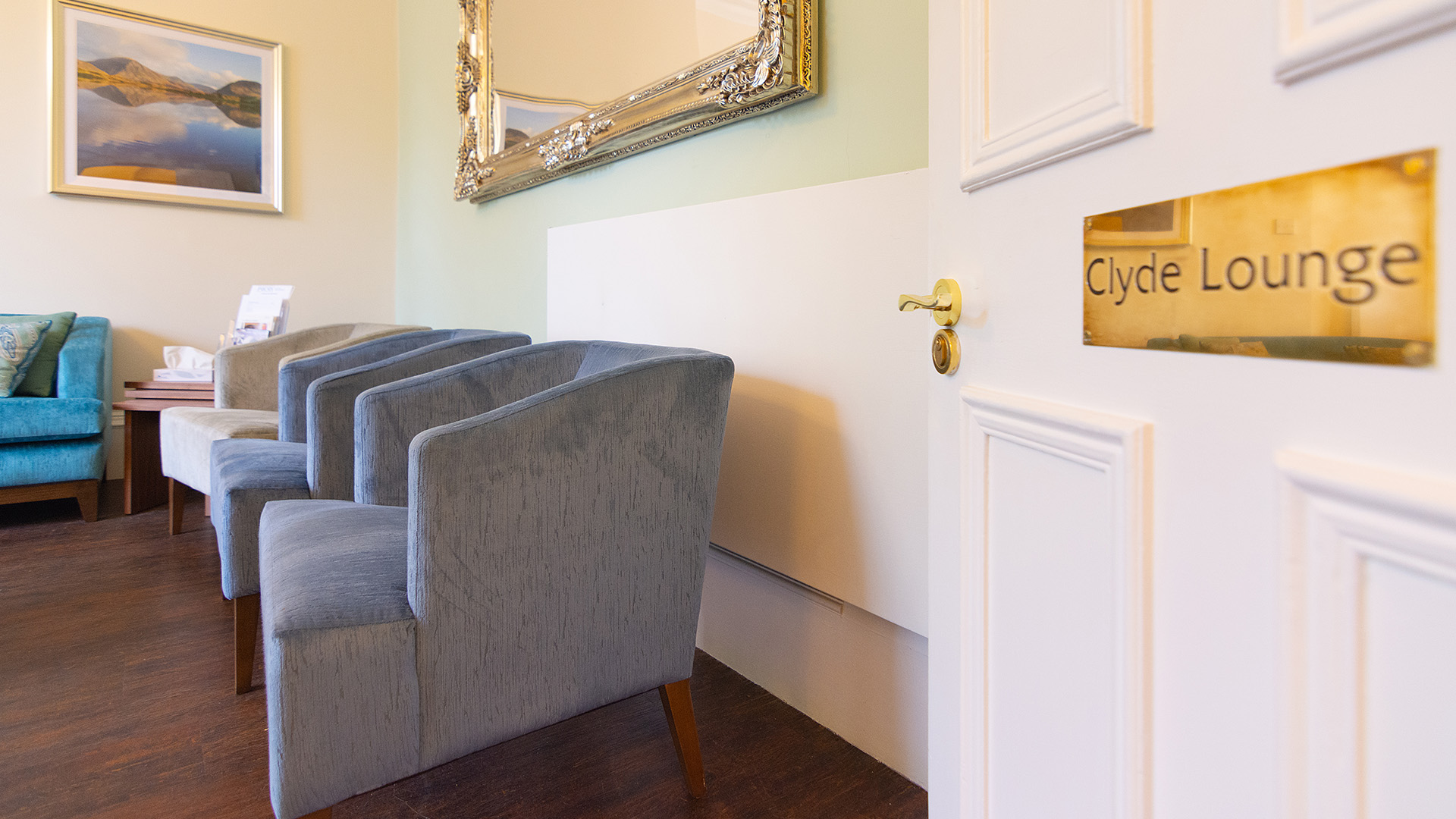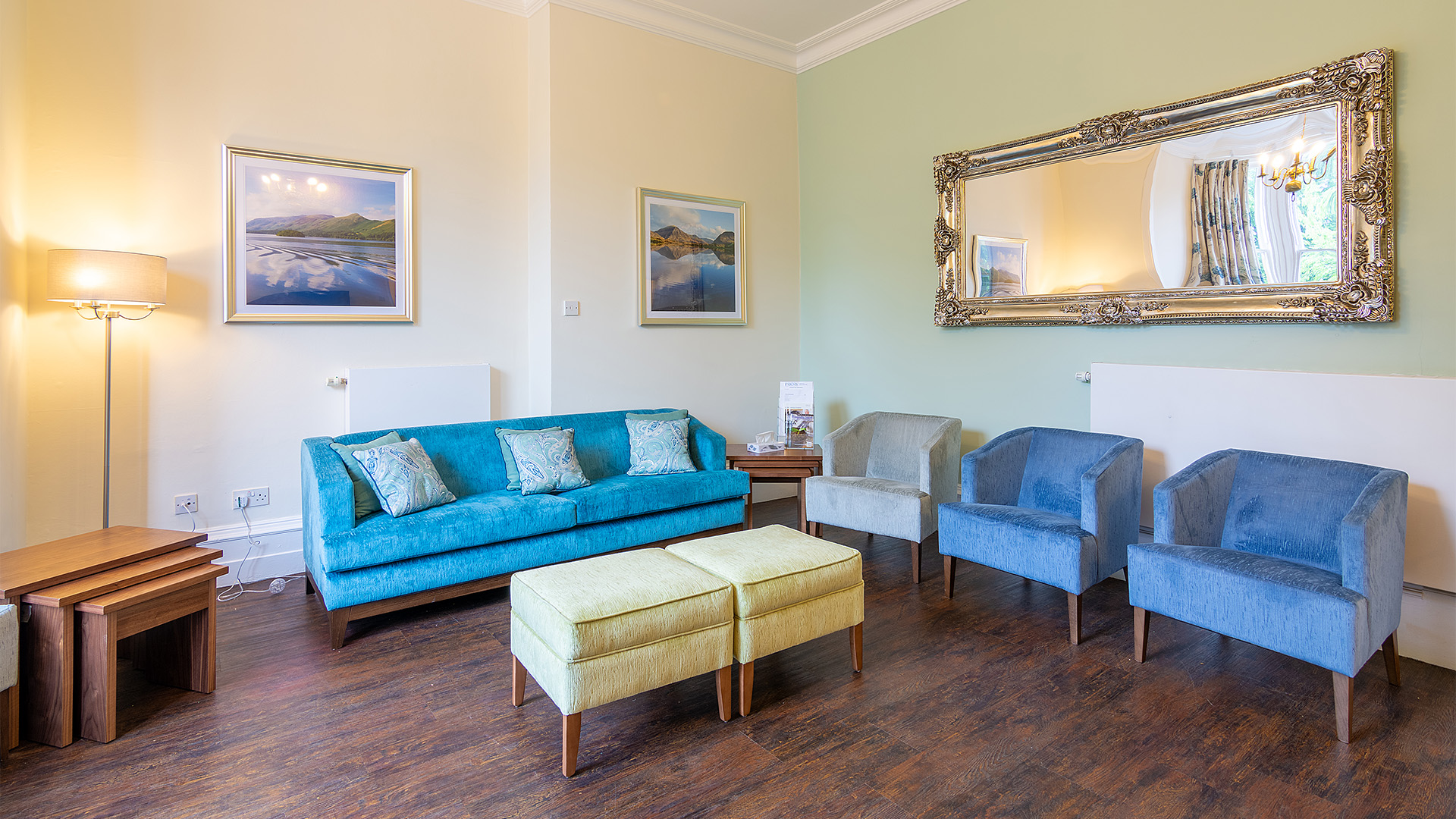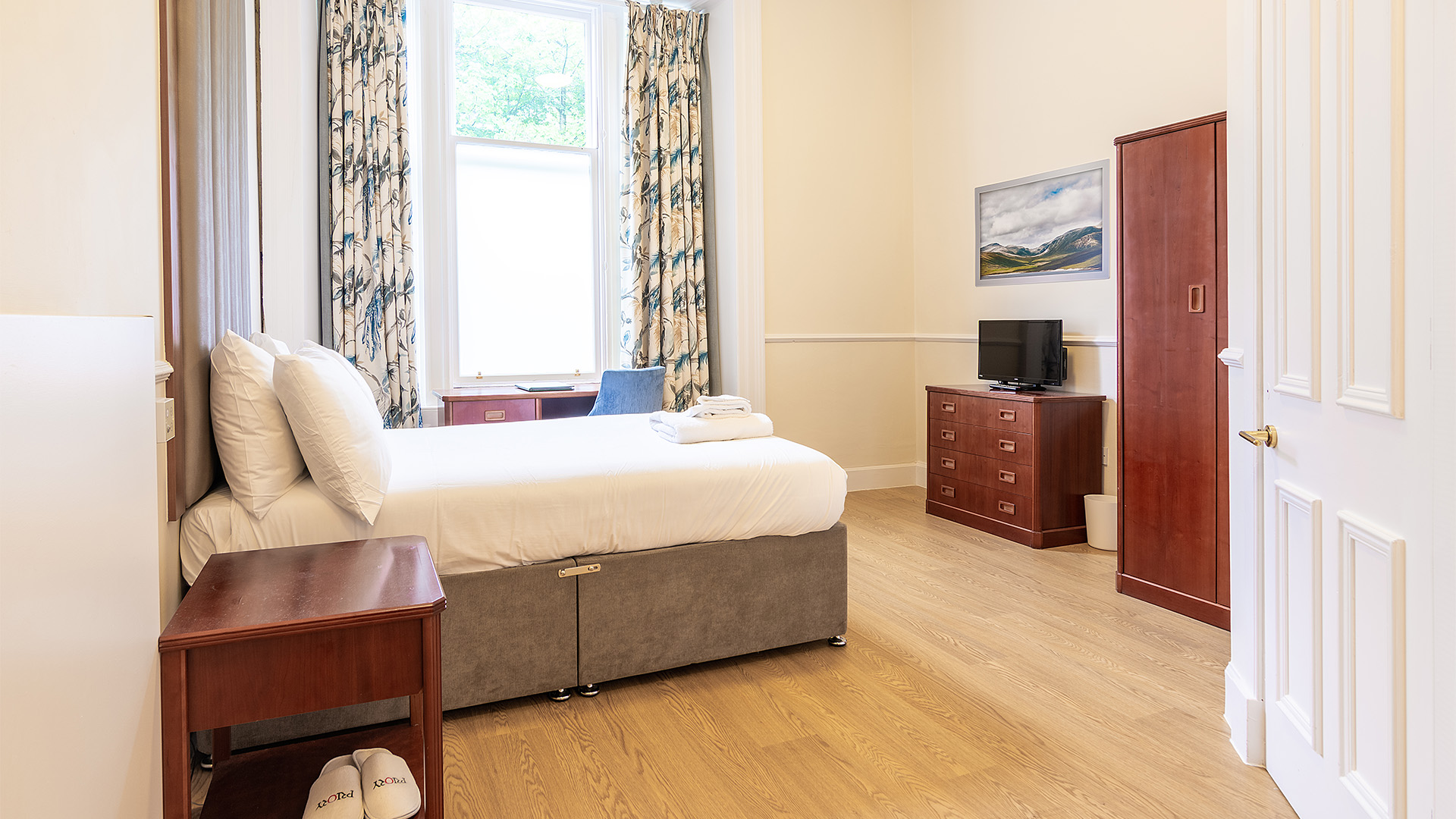About this location
Priory Hospital Glasgow is one of the UK’s leading centres for mental health treatment. In partnership with the NHS, we provide care for those struggling with eating disorders such as anorexia nervosa, bulimia nervosa or binge eating disorder (BED).
We are fully accredited with the Quality Network for Eating Disorders (QED).
Services at a glance
Contact us
Click here to enable this content
Services
Priory is the UK's largest independent provider of adult eating disorder services and we pride ourselves on offering quality, personalised treatment for every person we support.
Ward break down
- Coll – 14-bedded ward for males and females with an eating disorder diagnosis
- Barra – 9-bedded ward for females with an eating disorder diagnosis
Conditions treated
We are able to support people with a primary eating disorder diagnosis, including:
- Anorexia nervosa
- Bulimia nervosa
- Binge eating disorder (BED)
- Other specified feeding or eating disorder (OSFED)
We can also support people who present with the following challenges alongside their primary diagnosis:
- Depression
- Anxiety
- Stress
- Obsessive compulsive disorder (OCD)
- Bipolar disorder
- Addictions
We are able to accommodate informal patients.
Treatment approaches
At Glasgow, we offer an individualised, person-centred approach to all of our patients. Our patient-centred treatment programmes are based on the very latest thinking in mental health and are delivered by expert psychologists, psychiatrists, and other highly qualified mental health professionals. Our multidisciplinary team (MDT) are committed to delivering the finest mental health care available. We strive to improve the lives of every person who seeks support from us.
Our aim is to provide evidence-based support for people with eating disorders, mental health conditions and addictions, working closely with all key stakeholders, in order to meet positive patient outcomes.
Our eating disorder treatment programme is based on the bio-psycho-social model of intervention, with day-to-day support and monitoring of not only the patients’ psychological needs, but also their physical and social needs. We do our utmost to include the patient in every aspect of their care.
Our assessment and treatment options are overseen by a full and diverse MDT.
We offer:
- Cognitive behavioural therapy (CBT)
- Dialectical behaviour therapy (DBT)
- Mindfulness
- Person centred therapy (PCT)
- Trauma informed care such as eye movement desensitisation and reprocessing (EMDR) and FLASH techniques
- Group therapy
- 1:1 therapy
- Art therapy
- Occupational therapy (OT)
- Dietetic support
- Carers support groups
- RODBT
- MANTRA
We also consider patients’ pharmacological needs, depending on the type of eating disorder they have and how severe it is. All of the therapies that we offer are approved by the National Institute for Health and Care Excellence (NICE).
We are also accredited by the Quality Network for Eating Disorders (QED) and Accreditation for Inpatient Mental Health Services (AIMS).
Our team
- Psychiatrist
- Therapist
- Psychologist
- Nurses
- Occupational therapists (OTs)
- Senior management team
- Support services teams
- Dieticians
- Epilepsy training
- Medically assisted withdrawal training
- Specialist eating disorder training, including nasogastric feeding procedures
- Autism and learning disability
Therapeutic and community-based activities
We offer a range of therapeutic and community-based activities as part of a full treatment programme. We want to support people to become more confident and independent, preparing them to move through their treatment pathway towards community living.
Our therapeutic and community-based activities include:
- Yoga/Qi-Gong classes
- Relaxation groups
- Art therapy and other forms of creative therapies
- Walks in beautiful landscaped gardens
- Organised weekend trips and activities
- Access to a local gym
Our facilities and environment
We provide:
Our garden offers a patio area with furniture, lawn, greenhouse and planting areas. If any specialist equipment is required, we will assess this and access it for people to use.
Our bedrooms
Exclusion profile
Pathways
At Priory Hospital Glasgow, we have links into Priory Adult Care services, if required.
Downloads
IHC Duty of Candour Annual Report
A message from our site leader

We continually strive to live up to our excellent reputation, with a focus on continual quality improvement and patient safety. We aim to improve the lives of every individual who seeks support from us, leading to positive and successful outcomes
Priory Hospital Glasgow site leader
Comments from our patients and their family and friends
My stay at Priory Hospital Glasgow was the catalyst for a major life change for me
Information for family and friends
How do home visits work?
All home visits are discussed with the clinical team prior to these happening. If required, staff can assist and escort people on their home visit, or it can be arranged that family members can assist.
What is your visitation policy?
Visitors are very welcome. However, please check with the nursing team before arranging any visits as, occasionally, patients may not feel well enough to receive visitors. Visiting times are largely unrestricted outside therapy times. However, please be aware that lunch is served from 11.45am to 1pm, and the evening meal from 5pm to 6pm. Also, we do ask that visitors leave the building no later than 10pm. We are unable to accept visitors under the age of 16 unless they are accompanied by an adult at all times.
Will I be involved and kept up to date with my loved one’s care and wellbeing?
Yes, with consent from the person staying with us, we encourage family and carers’ involvement and participation.
Will my loved one be able to have a phone or call me?
People staying with us may be allowed to use a mobile phone, if appropriate. There is also a landline phone available for outgoing and incoming calls. We would encourage that calls do not take place during the hours of therapy interventions.
What type of things are families expected to provide, and what is provided by the home?
There is very little people need to bring with them. The following checklist might be helpful:
- Nightclothes
- Slippers
- Dressing gown
- Comfortable day and outdoor clothing
- Personal toiletries. Complimentary items are available in the bedrooms, but people may prefer to bring their own
- Any prescription medication
What are the bedrooms like?
All rooms are single, en-suite and are comfortably furnished with a flat screen television, DVD player, a small safety deposit box and a nurse call button. A member of staff will explain how to operate them. It may be necessary to change someone’s room during their stay, for clinical reasons.
Are external doors kept locked?
Not all external doors are locked. However, this is under review in respect of ensuring our buildings are safe and secure. Every person staying with us will be individually assessed for any risks to see what security is needed.
What do service users eat and how do meal times work?
We have a restaurant that is separate to the wards. A full menu is provided for breakfast, lunch and dinner. Meals can be brought to the ward if people are unable to attend the dining room. Each ward has a kitchen with facilities available for making tea, coffee and snacks.
How does laundry work?
We have washing and drying facilities on each ward that can be accessed by patients. Support can be provided if required.
Is there anything they can’t bring or have?
We have a restricted and prohibited items list, which is reviewed and updated regularly. This can be seen on request.
Are pets allowed?
For visiting, we would encourage that pets stay outside within the garden and the grounds. For those on the longer stay wards, people can keep small animals. This would be discussed and risk assessed to determine appropriateness, in line with our policy.
How do activities work?
Activities are provided as part of the treatment programme, within groups or one-to-one sessions. Activities can form part of the recreational programme inside and outside the hospital.
Do service users and families have an input into the service user’s care plans?
Yes, we encourage people staying with us, family members and carers to be involved within their care and treatment planning.
What are the car parking facilities?
In the interest of safety and security, people staying with us are not permitted to park their car on the hospital premises during their inpatient stay. We recommend that people get a taxi or a lift to the hospital. Cars parked at any time on the hospital premises are parked at the risk of the driver and owner. Cars are not protected by the hospital’s insurance and may not be covered by your own insurance.
What is the smoking policy? Can service users buy cigarettes?
2
How is treatment accessed and funded?
We don’t take referrals directly from individuals and families. Instead, the first step will be for you to reach out to the person’s GP so that they can be referred and funded through the correct NHS channel. Depending on the type of support needed, this could include local authority funding, NHS funding, joint funding between the local authority and NHS, or direct payments. Please note, referrals for NHS or local authority funded services must come from a referring organisation.
We also provide a private service where funding can be accessed via private medical insurance, or individuals can self-pay. For more information, please visit Priory Hospital Glasgow.
How to make a referral
Our customer service centre provides 24/7 support for NHS mental health enquiries and referrals. Our customer referral co-ordinators can support you from your first call right through to the enquiry conclusion, providing updates throughout the process. We offer 24/7 crisis referrals, fast access to bed availability and placements, and a single access point for end-to-end enquiry management.













